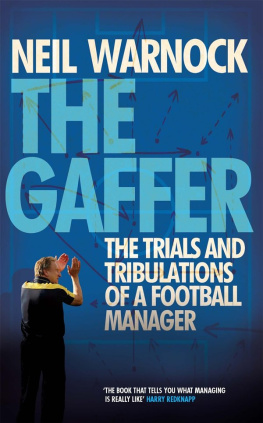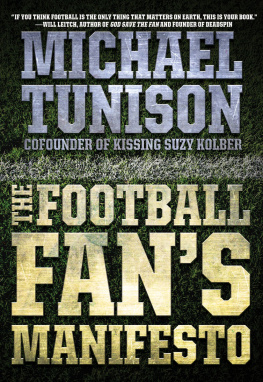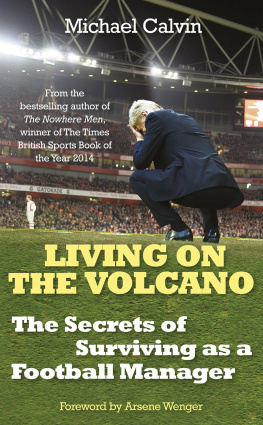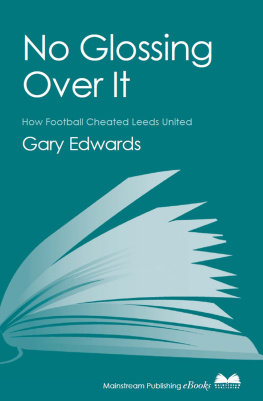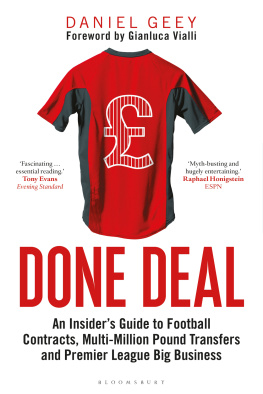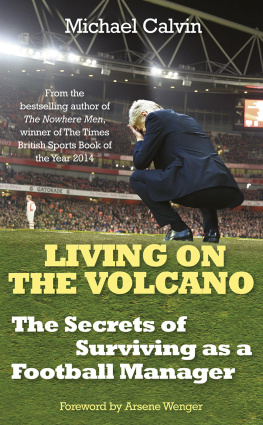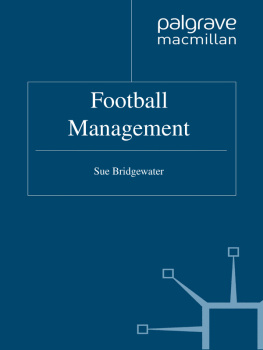Copyright 2013 Neil Warnock
The right of Neil Warnock to be identified as the Author of the Work has been asserted by him in accordance with the Copyright, Designs and Patents Act 1988.
Apart from any use permitted under UK copyright law, this publication may only be reproduced, stored, or transmitted, in any form, or by any means, with prior permission in writing of the publishers or, in the case of reprographic production, in accordance with the terms of licences issued by the Copyright Licensing Agency.
First published as an Ebook by HEADLINE PUBLISHING GROUP in 2013
Cataloguing in Publication Data is available from the British Library
eISBN: 978 0 7553 6278 3
HEADLINE PUBLISHING GROUP
An Hachette UK Company
338 Euston Road
London
NW1 3BH
www.headline.co.uk
www.hachette.co.uk
Contents
About the Book
How does a top professional football manager cope with the slings and arrows of outrageous fortune, with living, breathing and sleeping football 24 hours a day, 365 days a year? How does the man in charge handle the ever-present danger of getting sacked in the ultimate results business?
Neil Warnocks The Gaffer contains countless insights into the trials and tribulations, the joyous peaks and the soul-destroying troughs of life as a football manager. This wonderful new book takes fans into the changing room, the training ground and the boardroom. Warnock draws heavily on a lifetime of experiences at all levels in football, but particularly on his tumultuous spells at Crystal Palace, Queens Park Rangers, and Leeds United. From transfer dealings to negotiations with agents, from half-time team-talks to training sessions, from scouting trips to team-bonding sprees, from administrators to chairman, from injuries to referees The Gaffer spills the beans.
You wont have read a football book like this before.
About the Author
In his 13-year playing career Neil Warnock played for Chesterfield, Rotherham United, Hartlepool United, Scunthorpe United, Aldershot, Barnsley, York City and Crewe Alexandra. In his more than three decades as a manager he has taken charge of Gainsborough Trinity, Burton Albion, Scarborough, Notts County, Torquay United, Huddersfield Town, Plymouth Argyle, Bury, Sheffield United, Crystal Palace, QPR and Leeds United. Warnock has enjoyed seven promotions during his managerial career, taking both Sheffield United and QPR into the Premier League.
Glenn Moore, who assisted Neil Warnock with writing The Gaffer, is football editor of The Independent.
To Sharon: Now that Im home we can start having the times weve talked about and share more magic moments together. As I say to you every day, I really do love you loads darling.
To James, Natalie, Amy and William, you are simply the best. You have had to put up with all the rubbish that comes with the job but weve had some great times. Thanks for being down-to-earth through all the highs and lows. I know you have had to grow up learning to turn the other cheek but I couldnt be more proud of how you have all turned out.
To my Dad, who worked so hard, and my Mum, who went through so much.
To my brother John and sister Carole, who have always been there for me.
Acknowledgements
Management can be a lonely job and I couldnt have done it for so long without the men who have been alongside me in the dug-out for the last three decades. I first played against Paul Evans when we were teenagers, I scored a hat-trick for Chesterfield and Paul was in goal for Sheffield Wednesday. I never let him forget that, especially when he gets a bad back. I tell him I caused it with him having to bend down so much to pick the ball out of the back of the bet. He kept goal for me at Burton, and helped me start my management career at Scarborough and Notts County. Pauls still my best mate and I always take note of his opinion, which is all the more valuable now he is not in the professional game. Thanks pal.
Thanks too, to Mick Jones, my assistant manager for most of the last 20 years, Kevin Blackwell, who was with me 16 years as player and coach, David Kelly, Keith Curle, Stewart McCall and Ronnie Jepson. Different personalities all, but football people, good blokes, and great company.
Ive had a lot of chairmen, including some good ones: Ben Robinson at Burton was amazing in his backing and loyalty while Simon Jordan had everything. He was knowledgeable and supportive. Thanks also to Amit Bhatia for taking me to QPR where I had a wonderful experience turning the club around and worked with Gianni Paladini, who always made me smile and still does.
It has been a love-hate relationship with the newspapers over the years but there are some good guys including Rex Page, Mel Booth and James Shield in local media, and the late Brian Woolnough, John Sadler and Oliver Holt in the nationals. In particular Id like to thank the various sports editors at The Independent where Ive really enjoyed writing a column charting the ups and downs of the last eight years. Thanks especially to Glenn Moore, who has collaborated with me on those columns and on this book. He captures my voice brilliantly and weve had some good laughs together.
Jonathan Taylor, at Headline, has been hugely supportive of this project, and not just because he is a QPR fan, as has my literary agent David Luxton. Thanks also to Humphrey Price and Holly Harris for their input and Phil Shaw, author of several volumes of The Book of Football Quotations, for his assistance.
Last, but certainly not least, thanks to the players. You cant do anything in management without the right players. There has been too many to mention, but I have been lucky enough to have some good ones.
Introduction
I would never tell a plumber, a lawyer or a journalist how to do his job, but they all know better than me every Saturday.
Joe Royle
ITS SATURDAY NIGHT, IM DRIVING HOME FROM A GAME, and the radio is on. A phone-in starts. On they come, the armchair experts: hes taken the club as far as he can go, he picked the wrong team, he puts his subs on too late, he puts his subs on too early, hes tactically nave, he just hasnt a clue.
The calls might be about me, but it is just as likely they are about Arsne Wenger, or Roberto Mancini, Harry Redknapp or Andre Villas-Boas, even Sir Alex Ferguson. As a manager once said, there are two jobs everyone thinks they can do, prime minister and football manager. It doesnt matter how many trophies and promotions you have won, they know better.
But they dont. Not because they are daft, most football fans can see when a team is struggling and some can work out why, but because they will never have the whole story. Maybe a defender was left out because he has a personal problem, maybe a substitution had to be made as a midfielder was carrying an injury, maybe the manager is buying average strikers because he has not been given enough money to buy any better. There are a lot of things going on at football clubs most of which, for all sorts of reasons, the fans dont hear about. As far as possible this book goes behind the dug-out and describes what it is really like to be a football manager in the modern game.
I began managing in 1980, at Gainsborough Trinity in Lincolnshire. Mrs Thatcher had been in 10 Downing Street just over a year, mobile phones belonged to science fiction, there were fences up at football grounds, and the record transfer fee was 1.5m, for Wolves Andy Gray.

